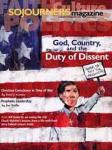Thomas Patterson says that the juice has been squeezed out of elections for Americans, with changes in political parties, media tactics, campaigning techniques, campaign structure, and election law all sharing the blame. Patterson, a professor at Harvard University's Kennedy School of Government, bases these contentions on the results of nearly 98,000 voter interviews conducted weekly between November 1999 and January 2001, combined with surveys from previous elections.
Political parties used to put their messages forward in the form of big ideas, to which potential voters would entrust their future and that of the nation, Patterson says. As these ideas waned, partisan conflict shifted to a myriad of issues, such as civil rights, the Vietnam War, street crime, sexual liberation, abortion, school prayer, and welfare dependency. Now citizens are less able to identify with and understand a party, Patterson writes, which has diminished their incentive to participate. Lower-income whites have been most affected by the change; they account for an increasing share of the nonvoters.
Weakened parties and party ideas led to candidate-centered campaigns. Americans were initially attracted but now dislike nearly everything about them, particularly when candidates appear more interested in fighting each other than in solving the electorate's problems, and more willing to hand out promises they have no intention of fulfilling. Even when levels of education and income are controlled, Patterson's data suggests that those who believe candidates behave like "street fighters" or "Santa Claus" are less likely to talk, think, or follow news of political campaigns. Negative politics makes many want less of politics.
Three primary changes in media tactics have also led to declining participation, Patterson says. First, rather than emphasize the newsmakers' words and actions, the media now place the journalist at the center of news stories. During the 2000 presidential campaign, network correspondents covering campaigns spoke for six minutes on the evening newscasts for every one minute that the candidates spoke. Second, the words of journalists are different from those of newsmakers. Journalists' description of politics is skeptical and negative, which has contributed to Americans' distrust of politicians. This distrust naturally contributes to reduced involvement, particularly among people ages 35 and younger.
Third, the trend toward increased soft news, a mixture of information with a heavy dose of entertainment, dilutes both politics and news and contributes to declining election interest. Patterson finds that whether people think and talk about the campaign on a given day is directly correlated with the amount of election coverage on that day. If news organizations cut back on their election coverage, as all save National Public Radio have done, day-to-day campaign involvement declines. On the whole, the 2000 campaign received half as much news coverage as the 1988 campaign.
INTEREST IS ALSO dampened by the structure of campaigns today. Long campaigns bore potential voters, making them less responsive to key events, unable to remember what they heard at earlier points in the campaign, and less well-informed than the electorate of the 1950s—even though today's potential voters have much more education.
The structure also creates a two-tiered electorate: those who can impact the outcome and those who can't. Residents of noncompetitive states are ignored by candidates seeking to put together an Electoral College majority. The front-loaded primary schedule for the presidential nominations means that aspirants must spend virtually all their time and money on the races before Super Tuesday, to the detriment of those that follow. Since a victory on Super Tuesday often effectively ensures a nomination, voter turnout and interest drops substantially in states with later primaries.
While elected office-holders often implore people to "get out and vote," many laws passed by those same people discourage people from voting. For example, 87 percent of Americans live in states that shut down registration two or more weeks before Election Day, even though the data is clear that an early closing date reduces turnout. In the six states that allow Election Day registration, turnout in 2000 was 15 percent higher than elsewhere.
Patterson makes pragmatic suggestions to alter the present system and, in the clear style of Derek Bok's recent book The Trouble with Government, openly wonders whether office-holders actually give a rip in the first place. After all, today's office-holders are tomorrow's incumbent politicians.
While it is typical to focus on Election Day turnout, the front end of the campaign is where the real participation problems reside. Political parties should enact shorter campaign cycles and hold a series of single-state primaries with a national primary one month later. These changes would keep potential voters engaged and give voters of every state a more meaningful vote. The media should increase their prime-time direct coverage of candidates and their campaigns and decrease time spent on minor blunders, scandals, and especially their own pontifications. And election law should be reformed with effective changes, such as allowing same-day voter registration and keeping the polls open longer on Election Day.
This is a well-written and thought-provoking book that is separated from the norm by its vast data. Its proposed remedies to the growing problem of political apathy are sensible—and possibly even doable if the will exists. Of course, that is the question.
Nathan Wilson lives in Wilmore, Kentucky, and serves as interim pastor of Eminence Christian Church, as finance director of a mayoral race, and as a high school assistant football coach.

Got something to say about what you're reading? We value your feedback!